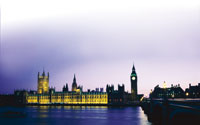Election 2010: Will a hung parliament be good for farming?

Farmers could be among the few beneficiaries of a hung parliament after next week’s General Election.
Opinion polls suggest no party will secure an overall majority for the first time in a UK general election since 1974, leaving the government unable to pass laws without support from members of other parties.
Pundits believe the lack of a clear winner on 6 May would be bad for Britain. After all, money markets prefer certainty. So a situation where no party can command power on its own could see the value of sterling tumble.
But any fall in sterling would boost subsidy payments calculated in euros – a prospect which will be music to the ears of farmers struggling to finalise Single Payment applications ahead of the 17 May deadline.
“A hung parliament wouldn’t be good for the economy as a whole,” says Pat Tomlinson, former head of agriculture at HSBC bank. “But farmers could be beneficiaries – at least in the short term.”
Weak sterling
Sterling’s weakness would be a net gain for UK farmers, believes Mr Tomlinson, who is now head of agriculture at the Moore Scarrott Partnership, an accountancy firm in south-west England.
True, the cost of imported farm inputs, such as fertiliser, would rise. But any increase could be more than offset by an exchange rate that would make food exports easier while boosting the value of subsidies.
Of course, farming would have to take its share of any painful government measures, including higher taxes and cuts in public spending to fix the economy. But agriculture would suffer less than other industries.
With days to go, polls indicate the most likely outcome is a Tory victory. But the lack of an overall majority would leave the Conservatives to form a minority government or enter a formal coalition with the Liberal Democrats.
“It is very difficult to predict,” says Nick von Westenholz, NFU government affairs adviser. “I wouldn’t nail my colours to the mast on anything. But you can look at the most likely scenarios and extrapolate what they would mean for farming.”
Minority government
A minority Tory government would seek alliances with other parties on an issue-by-issue basis. Failing to win votes on individual pieces of legislation would only matter if it became a regular occurrence.
“Losing standard votes on legislation wouldn’t bring down the government unless it kept happening. When you’re a minority government, the key thing to avoid is losing a no-confidence vote or a vote on the Queen’s Speech.”
Such a defeat could trigger a second general election. But two elections in quick succession are likely to result in a similar outcome – a situation that politicians from all parties will want to avoid.
“One of the parties will have to come to a deal with the Lib Dems,” says Mr von Westenholz. “Both Labour and the Conservatives realise that a deal with the Lib Dems is a better option than another election straight away.”
Lib-Lab coalition
But a formal Lib-Lab coalition would result in a much different outcome than a Lib-Con coalition, especially when it comes to farming. And it is possible neither will result in a Labour DEFRA secretary.
In a Lib-Lab deal, there would be a strong argument for the Lib Dems to be given the rural affairs portfolio. This is because Labour is likely to return few MPs from constituencies with significant farming interests.
But a Lib-Con deal is likely to see the Conservatives want to keep hold of rural affairs on the basis that the Tories will represent more countryside constituencies than the Lib Dems.
The prospect of a Lib Dem DEFRA secretary therefore remains quite some way off. Even so, it could happen, and Westminster watchers enjoy nothing better than pondering political possibilities.
As the secondary party in a coalition government, the Lib Dems would probably only be offered one or two cabinet seats. If DEFRA was one of them, it would therefore go to party leader Nick Clegg or his deputy Vince Cable.
Such a scenario is difficult to imagine. Which gives credence to the theory that the Lib Dems are more likely to work informally with a minority government than enter a proper coalition in return for a couple of cabinet posts.
All of which is bad news for Lib Dem rural affairs spokesman Tim Farron who is unlikely to get a look in whatever the outcome – despite helping to devise what is arguably the most farmer-friendly manifesto seen during this election.
It also means political horse-trading will continue for some time past the election. With everything up for grabs, and no single party in control, agricultural policies will be decided on an ad hoc basis.
Negotiation will be the name of the game. There might not be a run on the pound, but there will be uncertainty. And from an economic point of view, the country might suffer, but farming could benefit.
• See more of our General Election coverage here.
